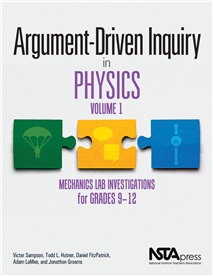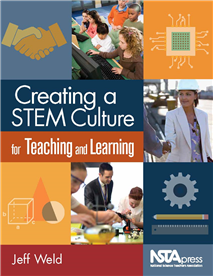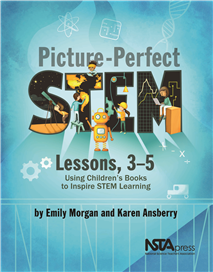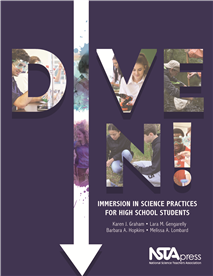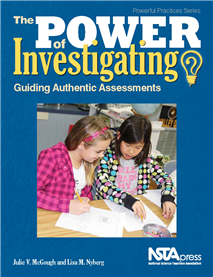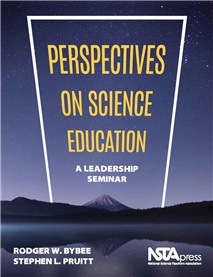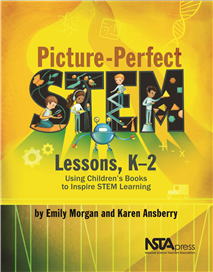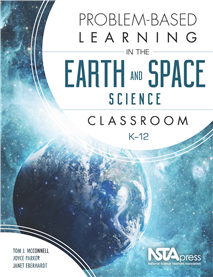All Book Chapters
Book Chapter
The purpose of this lab is for students to apply what they know about the disciplinary core idea (DCI) of Energy to measure the horsepower of a toy car and determine ”Which Toy Car Has the Engine With the Greatest Horsepower?” The Teacher Notes p...
Book Chapter
Creating a STEM Culture for Teaching and Learning (Book Sample)
This is the book that will flip the way you think about STEM from “not me” to “I’m in!” Author Jeff Weld is the director of the acclaimed Iowa Governor’s STEM Advisory Council. He sees STEM as “a white-hot, transformative revolution in ...
Book Chapter
Picture-Perfect STEM Lessons, 3-5: Using Children’s Books to Inspire STEM Learning (Book Sample)
"Teachers in our district have been fans of Picture-Perfect Science for years, and it’s made a huge impact on how they fit science into their school day. We are so excited to do more of the same with these Picture-Perfect STEM books!"—Chris Gible...
Book Chapter
Constructing an Explanation of the Big Bang Theory
This high school Earth and space science lesson has the following learning goals for students: identify appropriate and relevant information about the big bang theory; synthesize information to construct viable explanations of the formation of the un...
Book Chapter
Stars and Constellations: Using a Planetarium
This high school Earth and space science lesson has the following learning goals for students: locate and identify relevant information about a constellation and the stars within it; use a planetarium or a star finder to locate a specific constellati...
Book Chapter
This high school Earth and space science and physical science lesson has the following learning goals for students: locate and identify relevant information about how to make paint from minerals; relate their knowledge about the physical properties o...
Book Chapter
This high school Earth and space science and engineering and technology lesson has the following learning goals for students: apply engineering and design principles to make a sample of asphalt and formulate a report summarizing the problem, methodol...
Book Chapter
Exploring Biome Shifts With Climate Change
This high school Earth and space science and life science lesson has the following learning goals for students: use quantitative methods to identify the two to three most abundant tree species in a forested field plot (Activity 1); investigate future...
Book Chapter
This high school life science lesson has the following learning goals for students: design and conduct an experiment that addresses the properties common to living things; use teamwork to solve a problem; and synthesize and interpret observations to ...
Book Chapter
This high school life science lesson has the following learning goals for students: develop research questions and experimental designs to explain soil properties; collect relevant data using appropriate methods; synthesize and interpret observations...
Book Chapter
This high school life science lesson has the following learning goals for students: plan a lab procedure to explain diffusion in and out of cells; collect and record relevant data using appropriate methods; and synthesize and interpret observations t...
Book Chapter
How to Add the Science Practices to a Lecture: Experiencing the Equation for Cellular Respiration
This high school life science lesson has the following learning goal: students will be able to develop a representative model to show the components of the formula for cellular respiration. A materials list, teacher background information, an assessm...
Book Chapter
This high school life science and engineering and technology lesson has the following learning goal: students will be able to design an investigation to test the impact of human activities on the environment. A materials list, teacher background info...
Book Chapter
Long-Term Plant Growth Experiment
This high school life science, physical science, and engineering and technology lesson has the following learning goals for students: plan an experiment to explain factors influencing plant growth; collect and record relevant data using appropriate m...
Book Chapter
This high school physical science lesson has the following learning goals for students: develop and apply a procedure to determine the positive reactions for chemical indicator tests of organic compounds and apply their results to identify organic co...
Book Chapter
Enzyme Action Learning Sequence
This high school physical science lesson has the following learning goals for students: recognize that diastase is an enzyme that facilitates the breakdown of starch into sugar; design a procedure for evaluating whether the amounts of the substrate a...
Book Chapter
This high school physical science lesson has the following learning goals for students: design and conduct an investigation to determine the speed of sound in air; interpret their experimental results; and explain possible reasons for discrepancies (...
Book Chapter
This high school physical science lesson has the following learning goals for students: develop a testable hypothesis based on their observations; design and conduct an experiment to test their hypothesis; and effectively communicate the results of t...
Book Chapter
This high school physical science lesson has the following learning goals for students: design and perform an investigation to assess the physical and chemical properties of a set of metals; formulate the investigation design to determine the number ...
Book Chapter
This high school physical science lesson has the following learning goals for students: apply previous science knowledge and skills to solve a stated problem and explain the concept of density using appropriate equations and a floating canister demon...
Book Chapter
This high school physical science lesson has the following learning goals for students: construct a telescope; explain how a refracting telescope works; collect and graph data; and recognize advances in technology by comparing their telescopes to one...
Book Chapter
Rescuing a Lab That Isn’t Working by Integrating the Science Practices
This high school lesson for any science discipline has the following learning goals for students: develop a testable hypothesis based on their observations; design and conduct an experiment to test their hypothesis; and effectively communicate the re...
Book Chapter
Why Is Investigating a Powerful Teaching Tool?
Through investigations, teachers can allow students to explore concepts and develop understanding while maintaining the integrity of the curriculum. Hands-on, meaningful investigations give life to learning, inspire questions, and engage students and...
Book Chapter
How Do Investigations Prepare Students for Purposeful Learning?
Reading, writing, and technology become not only tools to enhance learning but also investigations in and of themselves. Investigations create three-dimensional learning experiences that include a variety of access points. This Part 2 covers how inv...
Book Chapter
How Do I Integrate Investigations?
When investigations are integrated thoughtfully, a dynamic learning environment is created and is visible in the classroom. This Part 3 provides ways to connect investigations within a unit of study, explains how investigations support depth of knowl...
Book Chapter
Perspectives on Science Education: A Leadership Seminar (Book Sample)
This book delivers what the title promises: perspectives on leadership and science education, presented in the form of a simulating seminar. Authors Rodger Bybee and Stephen Pruitt are two of science educator's most prominent thought leaders. Writin...
Book Chapter
Dive In! Immersion in Science Practices for High School Students (Book Sample)
What is it really like to plunge into the world of science learning and teaching? Find out in this unique book. Dive In! grew out of a teacher–scientist project at the University of New Hampshire that promoted active learning and using science prac...
Book Chapter
Picture-Perfect STEM Lessons, K–2: Using Children’s Books to Inspire STEM Learning (Book Sample)
"Teachers in our district have been fans of Picture-Perfect Science for years, and it’s made a huge impact on how they fit science into their school day. We are so excited to do more of the same with these Picture-Perfect STEM books!"—Chris Gible...
Book Chapter
When The Sun Goes Dark (Book Sample)
This richly illustrated book is a fun way to help young astronomers understand all the excitement during a solar eclipse. The book tells how two curious children and their grandparents re-create eclipses in their living room using a lamp, a tennis ba...
Book Chapter
The Power of Investigating: Guiding Authentic Assessments (Book sample chapter)
Children want to explore, dig, build, play, and wonder. To do this they need to touch, feel, see, observe, listen, manipulate, plan, and create. How does a teacher build and maintain a learning environment that will help students investigate meaningf...
Book Chapter
In this lesson, students help a comic book publisher create the scenery and story lines that include real geologic formations in different locations on Earth. Key words and concepts covered are landforms, geologic forces, and plate tectonics. Crosscu...
Book Chapter
In this lesson, students help a comic book publisher develop scenes and images of landforms found below the surface of the ocean. Key words and concepts covered are landforms, geologic forces, and plate tectonics. Crosscutting concepts explored are p...
Book Chapter
In this lesson, students help a comic book publisher understand the path of a drop of water traveling through the water cycle. Key words and concepts covered are water cycle, erosion, gravity, heating, and cooling. Crosscutting concepts explored are ...
Book Chapter
In this lesson, a girl wonders how volcanic rocks and sedimentary rocks ended up in the same area of the Upper Peninsula of Michigan. Key words and concepts covered are rock cycle, formation of rocks, plate tectonics, divergent margin, and rift zone....
Book Chapter
Lassen Volcanic National Park has several types of rocks in one location. It is an unusual mix of all three (igneous, sedimentary, and metamorphic). What does each rock type tell us about the area’s geologic history? Key words and concepts covered ...
Book Chapter
Southern California is affected by the San Andreas Fault. The geologic features and rock types along this fault tell of a history very different from the region just a short distance to the north. Two cousins try to learn more about how that part of ...
Book Chapter
In this lesson, a boy is worried that his new home in Alaska cannot possibly have warm weather in the summer. Key words and concepts covered are seasons and motion of Earth around the Sun. Crosscutting concepts explored are patterns, cause and effect...
Book Chapter
In this lesson, two siblings debate whether the water they drink has always been on Earth and has been used by other living things. Key words and concepts covered are water cycle. Crosscutting concepts explored are patterns, cause and effect, and ene...
Book Chapter
In this lesson, students in a class are invited to help report the weather on TV and need to learn about air masses and how they help predict the weather. Key words and concepts covered are air masses, weather, and weather forecasting. Crosscutting c...
Book Chapter
In this lesson, students examine scenes from the movie E.T. to see if the phases of the Moon match the time frame of the story. Key words and concepts covered are moon phases. Crosscutting concepts explored are patterns and systems and system models....



